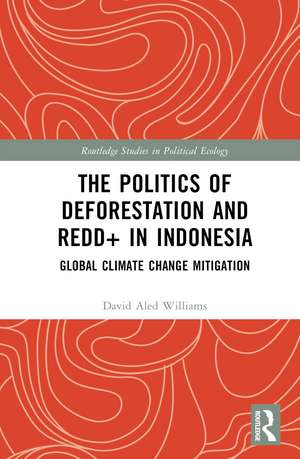The Politics of Deforestation and REDD+ in Indonesia: Global Climate Change Mitigation: Routledge Studies in Political Ecology
Autor David Aled Williamsen Limba Engleză Hardback – iun 2023
Drawing on the author’s political ethnographic fieldwork conducted in Jakarta, Central Sulawesi, and Oslo, where the author examined Norway’s interests and role in implementing REDD+, this book discusses the long evolution of the idea that foreign state and private financing can be used to protect tropical forests and the carbon stored within them, resulting in both local economic development and global climate benefits. It shows how neoliberal environmental approaches to climate change, of which REDD+ is a leading example, increase the severity of political contestations that must be overcome to reach global climate mitigation goals, and how recent incarnations of REDD+ have tended to forget earlier scholarly advice to couple anti-deforestation approaches with policies that reduce industrial carbon emissions. In Indonesia, tectonic political and economic forces are shown to have negatively impacted REDD+ implementation. Using a political ecology approach, the book links the literature on REDD+ with that covering Indonesia’s recent democratic regression, highlighting how the country’s environmental performance is inextricably linked to the timbre of its political governance. Given the severity of the political contestations that must be overcome to reach its stated goals, REDD+ cannot replace global policies that drastically reduce industrial carbon emissions.
This book will be of great interest to students and scholars of political ecology, deforestation, climate change, environmental politics, natural resource management, and environmental conservation.
| Toate formatele și edițiile | Preț | Express |
|---|---|---|
| Paperback (1) | 309.79 lei 3-5 săpt. | +16.79 lei 6-10 zile |
| Taylor & Francis – 28 noi 2024 | 309.79 lei 3-5 săpt. | +16.79 lei 6-10 zile |
| Hardback (1) | 998.71 lei 6-8 săpt. | |
| Taylor & Francis – iun 2023 | 998.71 lei 6-8 săpt. |
Preț: 998.71 lei
Preț vechi: 1217.94 lei
-18% Nou
Puncte Express: 1498
Preț estimativ în valută:
191.10€ • 208.23$ • 161.03£
191.10€ • 208.23$ • 161.03£
Carte tipărită la comandă
Livrare economică 23 aprilie-07 mai
Preluare comenzi: 021 569.72.76
Specificații
ISBN-13: 9781032213361
ISBN-10: 1032213361
Pagini: 162
Ilustrații: 2 Line drawings, black and white; 6 Halftones, black and white; 8 Illustrations, black and white
Dimensiuni: 156 x 234 x 11 mm
Greutate: 0.41 kg
Ediția:1
Editura: Taylor & Francis
Colecția Routledge
Seria Routledge Studies in Political Ecology
Locul publicării:Oxford, United Kingdom
ISBN-10: 1032213361
Pagini: 162
Ilustrații: 2 Line drawings, black and white; 6 Halftones, black and white; 8 Illustrations, black and white
Dimensiuni: 156 x 234 x 11 mm
Greutate: 0.41 kg
Ediția:1
Editura: Taylor & Francis
Colecția Routledge
Seria Routledge Studies in Political Ecology
Locul publicării:Oxford, United Kingdom
Public țintă
Academic, Postgraduate, and Undergraduate AdvancedCuprins
Introduction: Curbing Deforestation in the Hyper-Capitalist Age
1. REDD+ as Neoliberal Environmentalism: A Political Ecology Perspective
2. A Brief Political History of Indonesian Forest Governance
3. Bureaucratic Institutionalization or Business-as-Usual? REDD+ and Related Forest Policies in Indonesia
4. Success and Failure in the UN-REDD Pilots: REDD+ as Viewed from Central Sulawesi
5. Winners and Losers in the Indonesia–Norway REDD+ Story
Conclusion: Beyond REDD+, Towards Regenerative Nature–Society Relations
1. REDD+ as Neoliberal Environmentalism: A Political Ecology Perspective
2. A Brief Political History of Indonesian Forest Governance
3. Bureaucratic Institutionalization or Business-as-Usual? REDD+ and Related Forest Policies in Indonesia
4. Success and Failure in the UN-REDD Pilots: REDD+ as Viewed from Central Sulawesi
5. Winners and Losers in the Indonesia–Norway REDD+ Story
Conclusion: Beyond REDD+, Towards Regenerative Nature–Society Relations
Notă biografică
David Aled Williams holds a PhD in Development Studies from the School of Oriental and African Studies at University of London, UK. He is currently Senior Researcher at the Chr. Michelsen Institute, Norway.
Descriere
This book reflects on Indonesia´s recent experience with REDD+ (Reducing Emissions from Deforestation and forest Degradation), all set within a broader discussion of neoliberal environmentalism, hyper-capitalism and Indonesian carbon politics.







